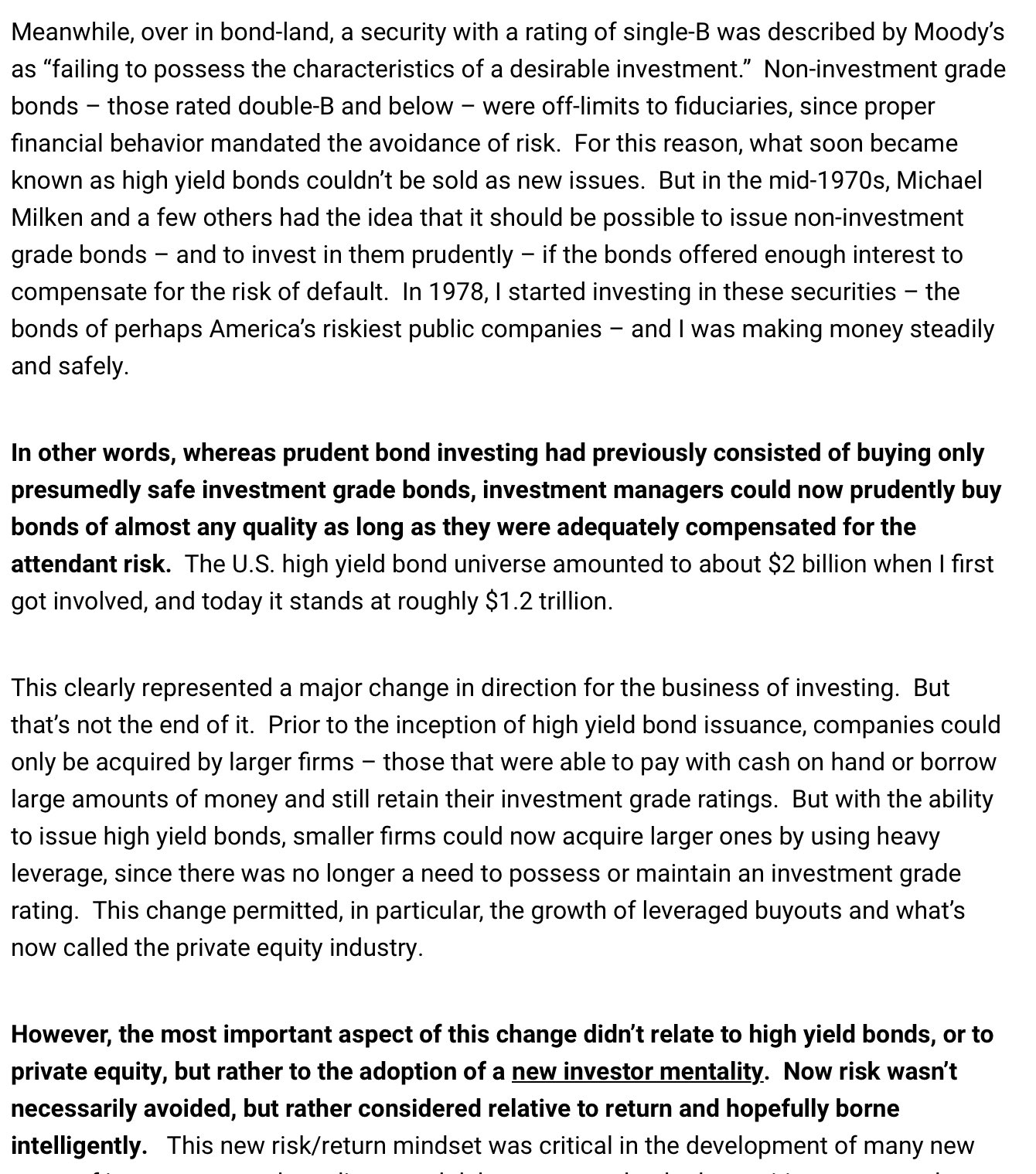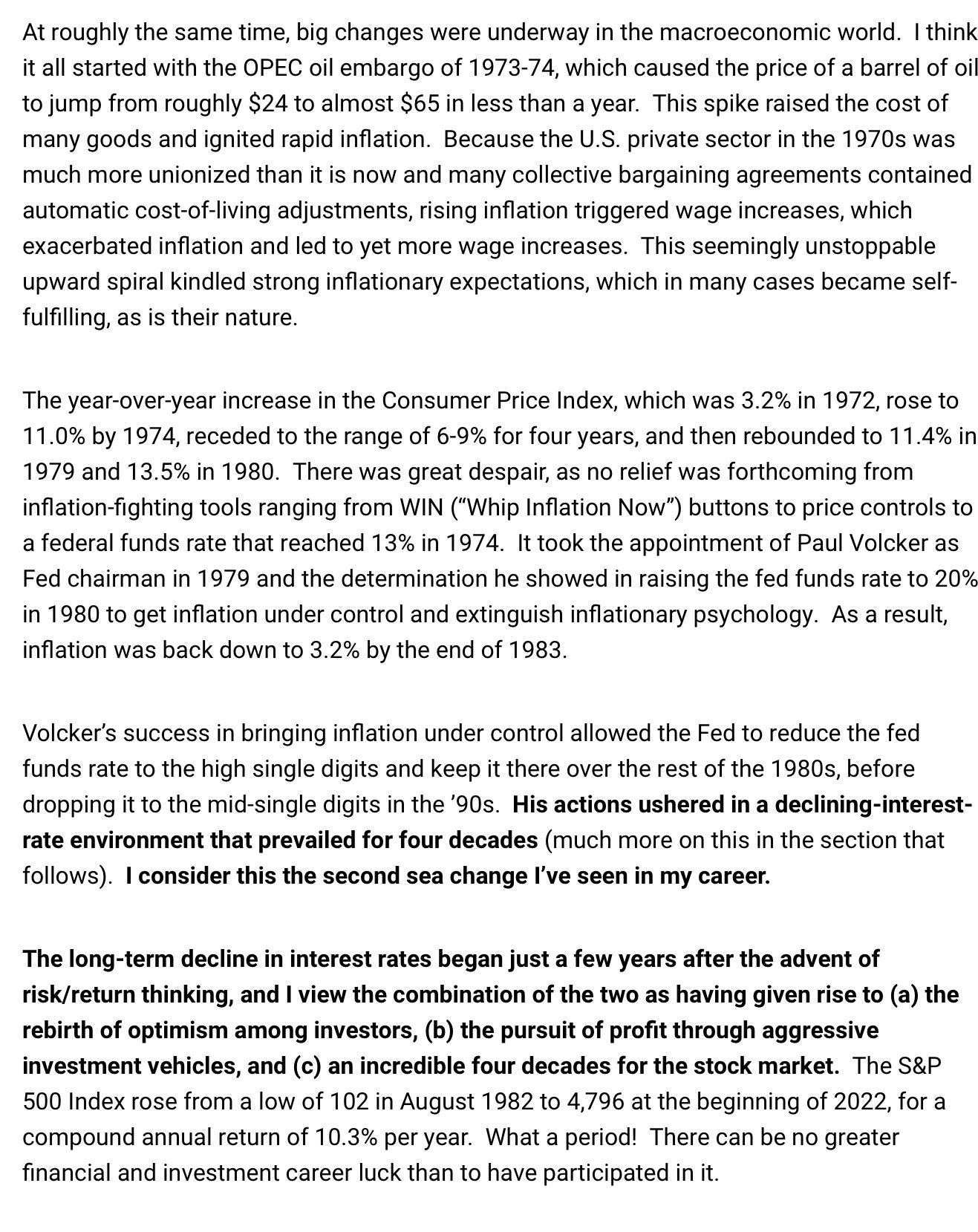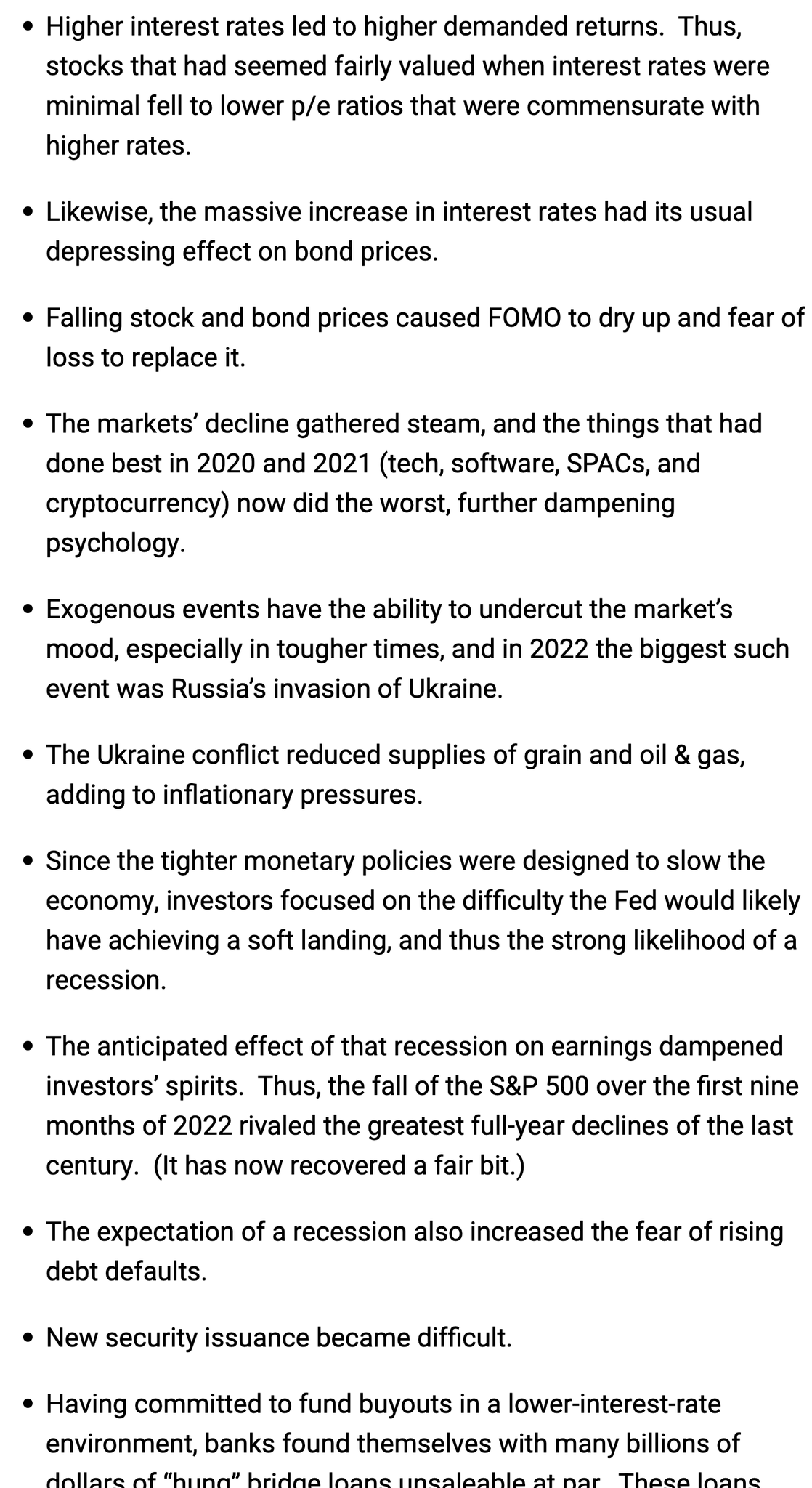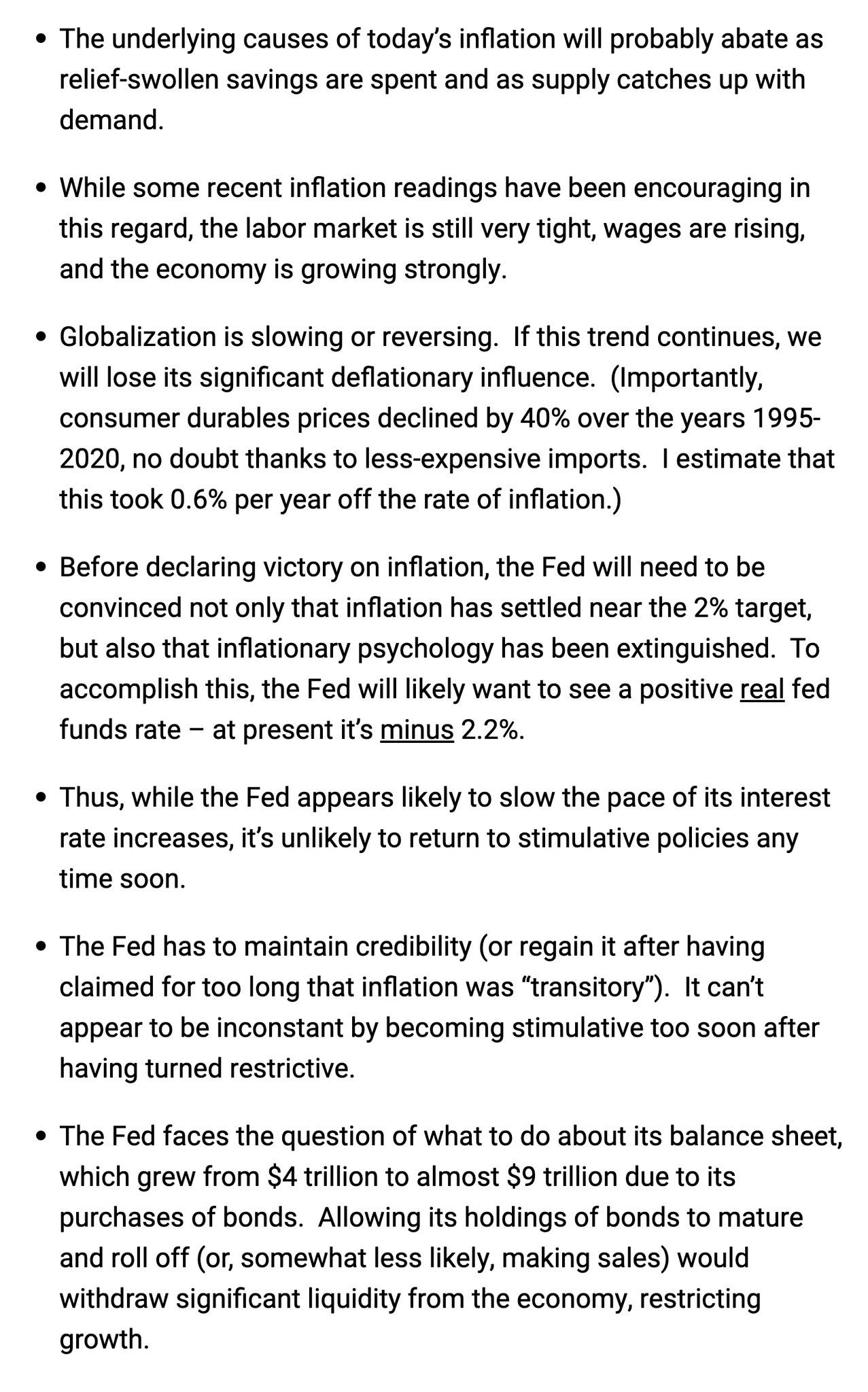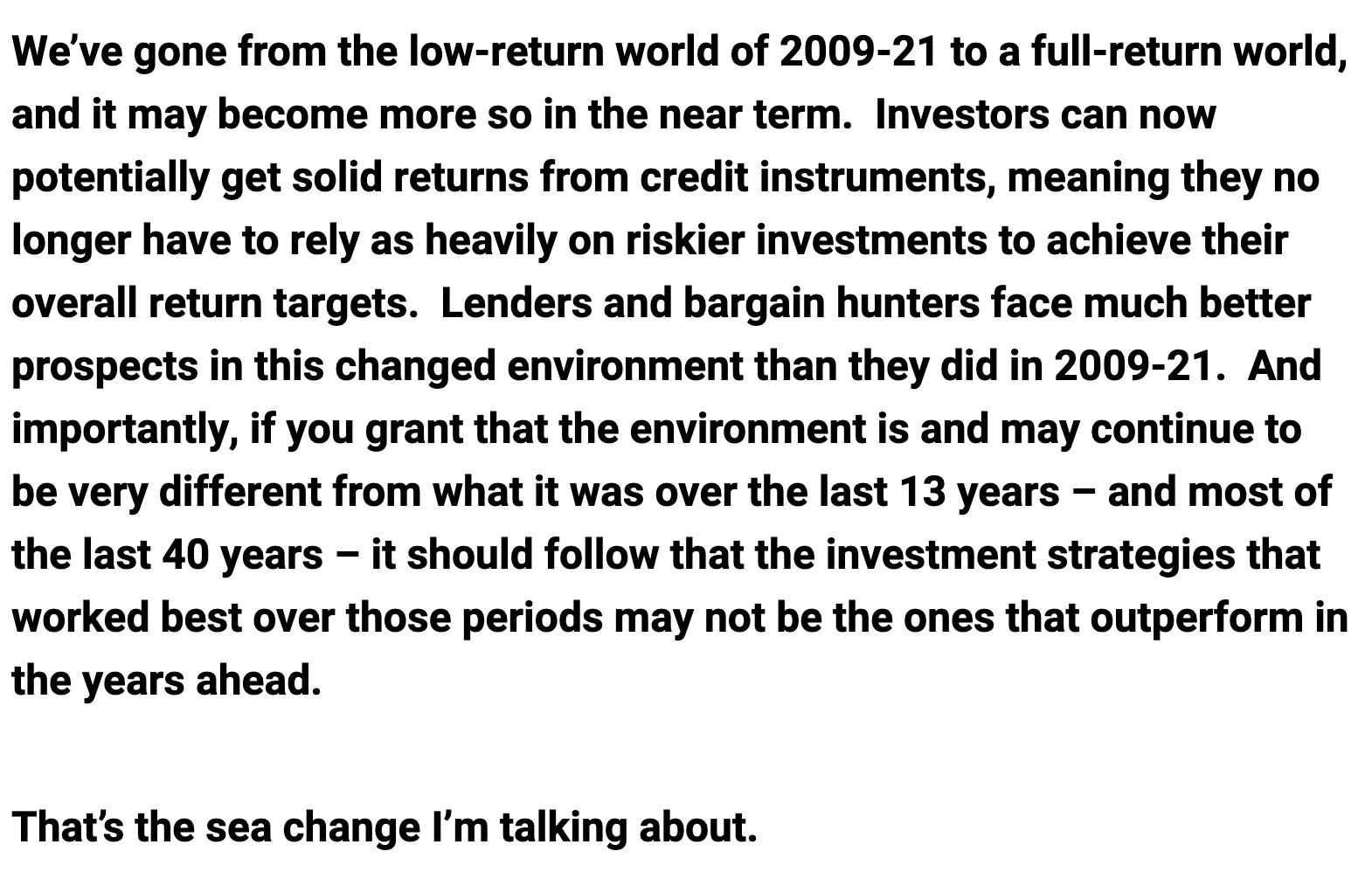Thread by Austin Lieberman
- Tweet
- Dec 20, 2022
- #Investment
Thread
Legendary investor Howard Marks just released a new memo.
“In my 53 years in the investment world, I’ve seen economic cycles, manias and panics, bubbles and crashes, but I remember only two real sea changes. I think we may be in the midst of a third one today.”
My Notes…
“In my 53 years in the investment world, I’ve seen economic cycles, manias and panics, bubbles and crashes, but I remember only two real sea changes. I think we may be in the midst of a third one today.”
My Notes…
The price you pay for a stock matters.
If you bought the Nifty Fifty in 1969 and held until 1974, you were sitting on losses of more than 90% . . . from owning pieces of the best companies in America.
If you bought the Nifty Fifty in 1969 and held until 1974, you were sitting on losses of more than 90% . . . from owning pieces of the best companies in America.
Sea Change #1 during Howard’s career came in the 1970s when legislation made High Yield bonds more accessible to investors.
The biggest change with this shift was a new investor mentality. Risk didn’t have to be avoided.
The biggest change with this shift was a new investor mentality. Risk didn’t have to be avoided.
The OPEC oil embargo of ‘73-‘74 sparked massive inflation. Oil jumped from $24 to $64 a barrel in a year.
CPI went from 3.2% to 11% from ‘72 - ‘74. By 1980, inflation was still 13.5%
Paul Volcker raised the fed funds rate to 20% in ‘80 and inflation dropped to 3.2% by ‘83
CPI went from 3.2% to 11% from ‘72 - ‘74. By 1980, inflation was still 13.5%
Paul Volcker raised the fed funds rate to 20% in ‘80 and inflation dropped to 3.2% by ‘83
Sea Change #2
The Fed Funds rate dropped to high-single digits in the late ‘80s then to mid-single digits in the ‘90s.
This started a four-decade declining interest rate environment which led us to where we were today
The Fed Funds rate dropped to high-single digits in the late ‘80s then to mid-single digits in the ‘90s.
This started a four-decade declining interest rate environment which led us to where we were today
"The S&P 500 Index rose from a low of 102 in August 1982 to 4,796 at the beginning of 2022, for a compound annual return of 10.3% per year. What a period! There can be no greater financial and investment career luck than to have participated in it."
Marks believes declining interest rates might have played the greatest role of all in investors' success over the last 40 years.
Kind of a scary thought as we exit that environment.
Kind of a scary thought as we exit that environment.
How declining interest rates impact investors and the economy.
They're basically an easy-pill for consumers to buy on credit and companies to invest in growth. But they can't stay low forever...
They're basically an easy-pill for consumers to buy on credit and companies to invest in growth. But they can't stay low forever...
The period between the end of the Global Financial Crisis in late 2009 and the onset of the pandemic in early 2020 was marked by ultra-low interest rates, and the macroeconomic environment. The effects were dramatic:
When Covid-19 caused the world’s economy to shut down, the Fed supercharged the economy by implementing a jumbo version of the GFC rescue plan in weeks instead of months
Okay, so what happens in a higher interest rate environment?
It all comes down to higher demanded returns which means that the fair value of stocks decreases as interest rates increase.
It all comes down to higher demanded returns which means that the fair value of stocks decreases as interest rates increase.
Marks believes inflation and interest rates "are likely to remain the dominant considerations influencing the investment environment for the next several years."
Here's what Howard thinks will happen with inflation and rates over the next few years.
Basically.. it's going to take extended aggressive policy from the fed to keep inflation in check. The fed has no reason to lower rates anytime soon (still historically low)
Basically.. it's going to take extended aggressive policy from the fed to keep inflation in check. The fed has no reason to lower rates anytime soon (still historically low)
Howard thinks we're in for a "less rosy" period in the years ahead:
- Recession in the next 12 - 18 months
- Deterioration of corporate earnings and investor psychology
- Default rate will rise
- Interest rates WILL NOT decline by 2,000 basis points from here
- Recession in the next 12 - 18 months
- Deterioration of corporate earnings and investor psychology
- Default rate will rise
- Interest rates WILL NOT decline by 2,000 basis points from here
Marks' summary:
"In many ways, conditions at this moment are overwhelmingly different from – and mostly less favorable than – those of the post-GFC climate described above. We’re unlikely to quickly see the same optimism and ease that marked the post-GFC period."
"In many ways, conditions at this moment are overwhelmingly different from – and mostly less favorable than – those of the post-GFC climate described above. We’re unlikely to quickly see the same optimism and ease that marked the post-GFC period."
Howard believes it is likely that the investment strategies that worked over the last 13 and 40 years likely won't be the ones that outperform in the years ahead.
So the question investors should be asking themselves is how should they adjust their strategy given these changes?
So the question investors should be asking themselves is how should they adjust their strategy given these changes?
A link to Howard Marks's Sea Change memo: www.oaktreecapital.com/insights/memo/sea-change
If you enjoy my Tweets, you'll love my weekly newsletter DIY Investor
I share my research, trades, and lessons learned to help make you a better investor.
Follow my $160k portfolio here:
Investor.beehiiv.com
I share my research, trades, and lessons learned to help make you a better investor.
Follow my $160k portfolio here:
Investor.beehiiv.com
